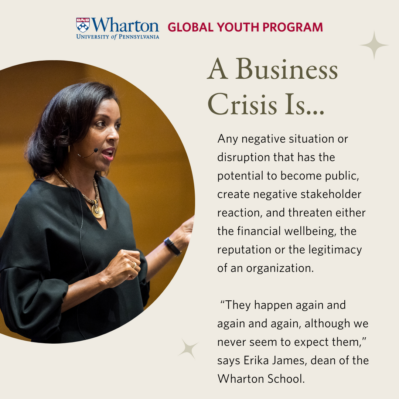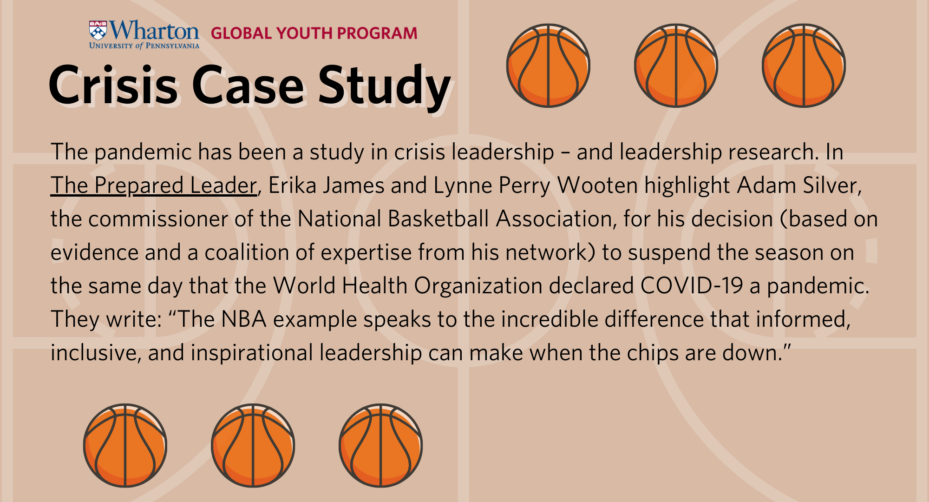Wharton School Dean Erika James Prepares You for Crisis Leadership


The business world often talks about the triple bottom line of people, planet and profits, which is to say a company performs well financially (the standard bottom line of profits), treats its employees and the community well, and takes care of the environment.
Erika James, dean of the Wharton School of the University of Pennsylvania, suggests that you add a fourth bottom line to the diagram of business success: prepared leadership.
“Prepared leadership is what will determine your ability to lead through the next crisis,” writes James in her book The Prepared Leader: Emerge from Any Crisis More Resilient Than Before (Wharton School Press, 2022), which she co-authored with Lynn Perry Wooten, president of Simmons University. “Prepared leadership is the one determinant that will help you navigate uncertainty – even chaos – in order to shape better outcomes and a better outlook for you and your organization.”

Dr. James, an expert in crisis leadership, spoke recently to hundreds of high school students studying on Wharton’s Philadelphia campus with the Wharton Global Youth Program, whose mission is to prepare tomorrow’s business leaders.
Someday, she told the group, you are going to be leading workforces where problems and crises emerge. “As a crisis leader, sometimes you’ve got to do the nuts and bolts of fixing a specific problem, but so much of that leadership is also how you engage with the people you are working with,” said James to the audience of high school students. “It’s not just how you respond when something happens. It’s what you do to prevent something from happening and to create the kind of work environment that allows people to flourish.”
James pointed out during her lecture that there are things that happen before leaders get to the point of battling a crisis – especially if it’s a kind of smoldering crisis that emerges over time — and things that happen afterward. In their 20 years observing and researching crisis leadership, she and Dr. Wooten have identified five phases that characterize crisis management. They are:
💥 Signal detection. “One of our core responsibilities is to pay attention to what’s happening in the environment that lets us know that we might be experiencing a smoldering crisis. What are the cues? What are the small, errant issues or problems that seem insignificant, but if we’re really paying attention and we’re looking at data from all sources within the organization, we might realize we’ve got a bigger problem here?” said James. “Your responsibility as a leader is to engage in signal detection and to read what is happening in the environment to give you insight that you might need to take action to prevent something from happening.”
💥 Preparation. “There are a lot of biases that exist in our heads that prevent us from ever thinking about anything going wrong,” noted James. “We think, ‘That is never going to happen to me! My company is never going to have that experience!’ When we have these biases and we assume we are invulnerable to problems or crises, we never prepare for them. Which then means we are on our back heels when something does in fact happen.”
💥 Containment. “This is the essence of what most people think about when they hear the word crisis management,” observed James. “There’s a problem, there’s a crisis that hits. You immediately have to contain the problem. You have to engage in damage control. That is a necessary, but I think insufficient, part of our responsibility as leaders. Of course you’ve got to fix a problem once it happens. But if that’s all you do, then you’re missing out on your ability to think about what you can do to take initiative before the crisis hits or even after the crisis hits.”
💥 Business recovery. “During the pandemic we heard, ‘I can’t wait to get back to business as usual. I can’t wait to get back to the way things were. If we could just go back to pre-2020,’ recalled James. “The reality is once you’ve experienced a crisis, it’s never going to be the same. And you’ve missed the opportunity to execute on a strategy that would take you to a different level, which is what your competitors have been doing all along. Business recovery is thinking about how to elevate and leapfrog ahead, given that you’ve had this restraint.”
💥 Learn from the crisis. “Lastly, your responsibility as a leader is to help your organization learn from the crisis,” said James. “Make lemonade out of lemons. You must stop to reflect on what you’ve experienced and what new you have learned. If we don’t reflect and learn from the pandemic, for example, then we’re not going to be able to take advantage of those experiences to create something new going forward.”
Without effective leadership, the impact of any crisis will always be worse, stressed James, who has put her own research to the test since becoming the leader of Wharton at the very start of the pandemic.
Successful crisis management, she added, is related to the work environment you establish. “To me, one of the fundamental responsibilities of a leader is to generate trust within the organization,” said James. “That means that you have to demonstrate yourself to be a trusted leader, both competent in what you do and that you communicate truthfully and follow through on the things you say you’re going to do.”

Conversation Starters
What is crisis leadership and why is it so important?
Erika James says, “Your responsibility as a leader is to help your organization learn from the crisis.” What have you learned from a recent crisis, either business-related or otherwise? Share your insight in the comment section of this article.
Why does Dr. James say, “Prepared leadership is the one determinant that will help you navigate uncertainty?”
Erika James- Dean of Wharton School.
May I have the floor with your students, guests, colleagues and distinguished faculty. A crisis is more than this, it is the birth of great men and women, internal or external of any organization. Yet in my royal culture, a crisis is challenge. So long ago dean, a little Brazilian man name Albert Santos Dumont demonstrated his mental will to be bold, innovative and global in every step to demonstrate how imagination can create opportunity, yet when faced with the chaos of a world entering into and exiting the time frame of World War. He planted the seeds of inspiration among the Brazilian children and his countrymen. The flight of one man who dared to demonstrate with his numerous creations and my favorite the Demoiselle has always inspired. For we are Embraer- airplane manufacturer founded by Ozires Silva Entrepreneur and first CEO. Yet, I believe that diversity fills the kettle with cooperative flavor for greater community consciousness leading to greater synergy outcomes. Diversity in membership and ideas allows for organizations to collaborate against multitude of varying problems. The goal is to create macro or micro projects (government & private) that exceed challenges, for the challenge itself will always define winners and losers. Today challenges are nested in a sea of financial uncertainty that is now in the clutches of a global pandemic. This has amplified our emotional uncertainty and created strife based upon “fear”. The view of climate crisis as a homeostasis threat to your civilizations every day consumption is the frosting to the cake. The cake representing the layers of problems we all face now, that have resurfaced from the past lesson unlearnt or forgotten. Two key solution, one being a global-reduction government debt holiday. The second key being a innovation investment campaign into creating better worlds we all can enjoy from entrepreneur investments that yield human capitol profits. (simple-example-tech charity-phone-app that raises funds to support tree growth in desserts that grow farm crops) This uncertainty of fear is both external and internal to those who navigated these challenges. This can be a source of constant stress upon an organization that is experiencing a fluctuate in synergy. Yes Dean Erika James these pearls of wisdom (Signal detection, Preparation, Containment, Business recovery, Learn from the crisis) are triumphed by taking and making one decision to be “daring.” Yet you state; “As a crisis leader, sometimes you’ve got to do the nuts and bolts of fixing a specific problem,” that is correct in the scope of the challenge your organization will face. Leaders and leadership and mutual exclusive in their relationship. This why being Bold, Innovative and Global allows brands to be transformational in any global market or cycle. Yet on the personal level it is the boldness to execute that counts, being innovative in solutions scores the points and creating a global audience product rollout that defines History. The hall mark of the crisis is nested in the challenge. This is why, I dare to be the Father of Industry and to be the first individual to create the intellectual property on a challenge. The Arctic Falcon Celestial – One is the most advance vehicle in the world. For, let me state this with clear intentions that my countrymen is Albert Santos Dumont the Father of Aviation and I Travis Anthony Rose dare to be Bold, Innovative and Global.
(softly said) Thank you, Erika James Dean of Wharton School.
Dr. James nails how cognitive biases like overconfidence stop leaders from prepping for crises until it is too late. Early signal detection is not just theory. It is what failed companies during the pandemic and corporate scandals missed. Real crisis leadership means not only managing fallout but embedding resilience by learning and adapting fast. Trust and transparency are not fluff. They are survival tools when uncertainty hits.
Crisis leadership means counteracting a crisis and, if it strikes, ensuring a swift recovery while learning from the experience. Every company will face a crisis eventually. Its magnitude and frequency hinge on the leadership. Leaders and managers, with their full view of the organization, are responsible for shaping its strategy. Even when employees give their all, they usually won’t spot an incoming crisis until it’s too late. For example, in the early 1980s, Intel faced a major crisis. Thanks to the swift, sharp decisions of Moore and Grove, Intel not only resolved it but emerged stronger.
Leaders are vital for preparing organizations for unexpected events like COVID. They need to stock sufficient supplies, maintain inventory, and keep a backup plan ready. I believe Dr. James emphasizes this because only leaders can drive a company forward. When prepared and clear on their actions, they’ll guide the organization to outpace competitors, learn from setbacks, and stay resilient against crises.